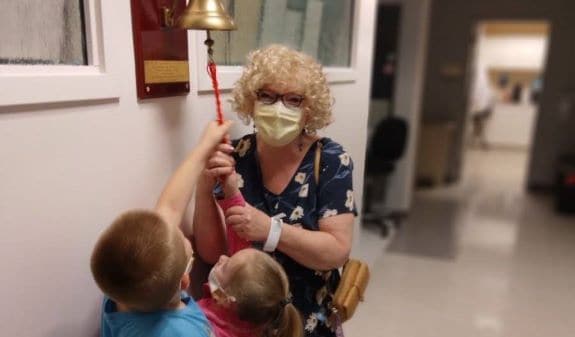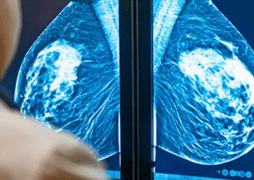
The Susan G. Komen voucher pilot program closed in the limited communities it was available in November 2023. Komen navigators continue to provide educational, practical, and emotional support to individuals seeking breast cancer screening and diagnostic services. Contact Komen’s free Helpline at 1-877-GO-KOMEN to speak to a trained navigator today.
By Dr. Omatola Gordon-Rose, DrPH, MPH, GCBM

Komen’s Health Equity Initiative (HEI) works to advance health equity and improve breast cancer outcomes for historically marginalized and under-resourced communities. Using education, patient support, workforce development, research and public policy initiatives, HEI facilitates and integrates Komen’s collective racial and health equity strategic initiatives across our mission to deliver impactful and meaningful change.
We believe that everyone should have a fair and just opportunity to be as healthy as possible despite their cultural or demographic background, which is why we are committed to removing barriers to care for individuals and communities that experience breast health inequities.
Breast health inequities in the Black community result in Black women in the U.S. being almost 40% more likely to die than white women. Why? Because the health care system has failed them — and continues to fail them — every step of the way during their breast cancer experience. Black women are often hard-hit by multiple barriers including the combined effects of racial, gender, ethnicity and other forms of bias while navigating racist institutions, structures and systems.
Imagine two women in the same city in the United States, one Black and one white. Both receive a diagnostic breast service from their health care provider. Both are insured. Both are the same age. You would think these two women would receive the same types of services and, upon diagnosis, the same level of treatment. However, in a health care system riddled with inequities, this is not the case.
These inequities demand significant change, and Komen has taken up the mantle to drive what we’re calling a Health Equity Revolution.
Komen has been working to advance health equity for years, and we have learned some key things. Most importantly, we must move from talking and describing the problem to providing solutions that work on multiple levels. Those solutions are critically important to the Black community. Therefore, we are doubling down on our efforts with Stand for H.E.R. – a Health Equity Revolution to advance breast health equity in the Black community. Launched last year, this bold program is our commitment to collaborating with Black communities, policymakers, researchers and other key stakeholders to help create a world without inequities where Black people have the same chances of surviving breast cancer as anyone else.
Stand for H.E.R. applies our comprehensive Mission approach to decrease breast cancer disparities through focused Komen interventions that break down the barriers that created these inequities for Black people. So far, through this program, with the help of our interventions, we’ve been able to provide increased support to the Black community to ensure people get the care they need and advance health equity.
Here are the Stand for H.E.R. interventions and how we’ve been able to deploy them to break down barriers:
Educational Empowerment
Through Stand for H.E.R., Komen has developed culturally relevant and responsive educational materials to equip Black people with knowledge about breast health. We continue to provide resources tailored to the Black community on a variety of topics, including understanding your risk of breast cancer, screening basics, getting high-quality care, and genetic counseling and testing.
We also offer tools to support education about breast self-awareness, a Worship in Pink Program that engages the faith-based community, ways to use your voice as an advocate and much more.
Patient Support
To ensure the Black community has connection to timely, high-quality care, we provide education, resources and emotional support for Black patients and caregivers through Komen’s Patient Care Center, which is a suite of direct patient programs designed to ensure that no one faces breast cancer alone.
The Patient Care Center programs include our Breast Care Helpline, which offers psychosocial support and connections to breast health resources, a screening and diagnostics program, financial assistance, patient navigation and education resources for anyone concerned about breast health. We are also working to increase access to genetic counseling and testing service for Black families through educational support and pilot programs in select communities.
The Komen Patient Care Center programs are proven health equity-based interventions designed to focus on communities experiencing health inequities and remove barriers to care. The program has supported patients like Janice in New York who was a young mother facing eviction from her home due to the difficulty of managing the rising costs of her breast cancer treatment and the costs of daily living for her family. The Komen team provided her emotional support and financial assistance and worked tirelessly to help her secure a public housing voucher so she could stay in her home.
Since 2021, the Patient Care Center has supported more than 10,000 Black patients. People can easily access the Patient Care Center by contacting the Breast Care Helpline at 1-877-GO-KOMEN or helpline@komen.org.
Workforce Development
As part of the Stand for H.E.R. program, we’ve developed a patient navigation training program that improves workforce diversity and enhances health care workers’ ability to equitability navigate patients. The patient navigation program trains, equips and mobilizes Black patient navigators across the nation to deliver best-in-class, culturally responsive navigation services. Part of this training includes Komen’s Racism & Bias interactive course, which educates individuals about how Black people experience systemic racism and bias within the health care system.
After reflecting on the training, one participant noted “I am honored that this program (was) created as an African American Health Initiative so that I as a Black woman, can assist other fellow Black women in receiving adequate cancer care.” To date, 189 health care workers have completed our patient navigation training.
We continue to grow this program to encourage more Black patient navigators to participate. In fact, we recently held our first Navigation Nation Summit: Navigating a Path to Health Equity, a virtual educational interactive summit that focused on the intersection of health equity and patient navigation that provided navigators with strategies to address barriers and other factors that contribute to health inequities. Over 300 people attended the summit with 55% identifying as racial and ethnic minorities. One hundred percent of professional navigators who responded to the post-summit survey expressed an increase in knowledge that they intend to apply within their current roles.
Representative Research
Since we know that representation matters, we’re working to ensure that research is representative and benefits all. By investing in breast cancer disparities research, we can better understand the intersection of biology, behavior and social/systems contributors to disparities and then develop and test multi-level approaches to eliminate them. We’re also diversifying the breast cancer research workforce by providing funding and career development support to researchers from underrepresented racial and ethnic backgrounds.
We also want to work with diverse populations directly, so we’re engaging them by
training and empowering patient advocates that represent all people diagnosed with breast cancer to bring the patient voice to research. Along with that we’re also creating a patient-driven breast cancer research registry to offer people diagnosed with breast cancer a new way to participate in research and ensure research data are as diverse as the people touched by this disease.
Policy Creation
We’re also very hard at work advocating for and creating policies that promote health equity. We’re expanding government funding for breast cancer research and supporting increased education, use of and access to clinical trials for all patient populations. To alleviate the burden on patients, we’re supporting policies that lower out-of-pocket costs, protect patients from the financial strain of treating breast cancer and reduce the systemic hurdles patients must overcome to access their care. The input from the lived experience of all people diagnosed with cancer is critical so we’re increasing engagement of grassroots advocates. Plus, we’re providing training about the role of public policy in reducing disparities and creating an avenue for engagement with elected officials through our Speak Truth to Power programming.
Our work to extend the reach of the Stand for H.E.R. program will continue as we work to save lives to meet the most critical needs of our communities and invest in breakthrough research to prevent and cure breast cancer.
The Stand for H.E.R. program is one of the many examples Komen was able to bring to the members of the National Breast Cancer Roundtable Steering Committee, a coalition formed by the American Cancer Society to speed up progress to end disparities and reduce mortality from breast cancer. The National Breast Cancer Roundtable was launched at the White House on Oct. 24 at an event hosted by First Lady Dr. Jill Biden. By adding our voice to this group, we hope to energize the breast cancer advocacy community to join us as we work to advance health equity beyond these interventions and make a greater impact.
We hope you’ll join us as we Stand for H.E.R. to drive a Health Equity Revolution that puts an end to inequities and ensures that Black people achieve better breast health outcomes. To learn more about the Stand for H.E.R. program and the Komen Health Equity Revolution, visit https://komen.org/healthequity or contact info@komen.org.



